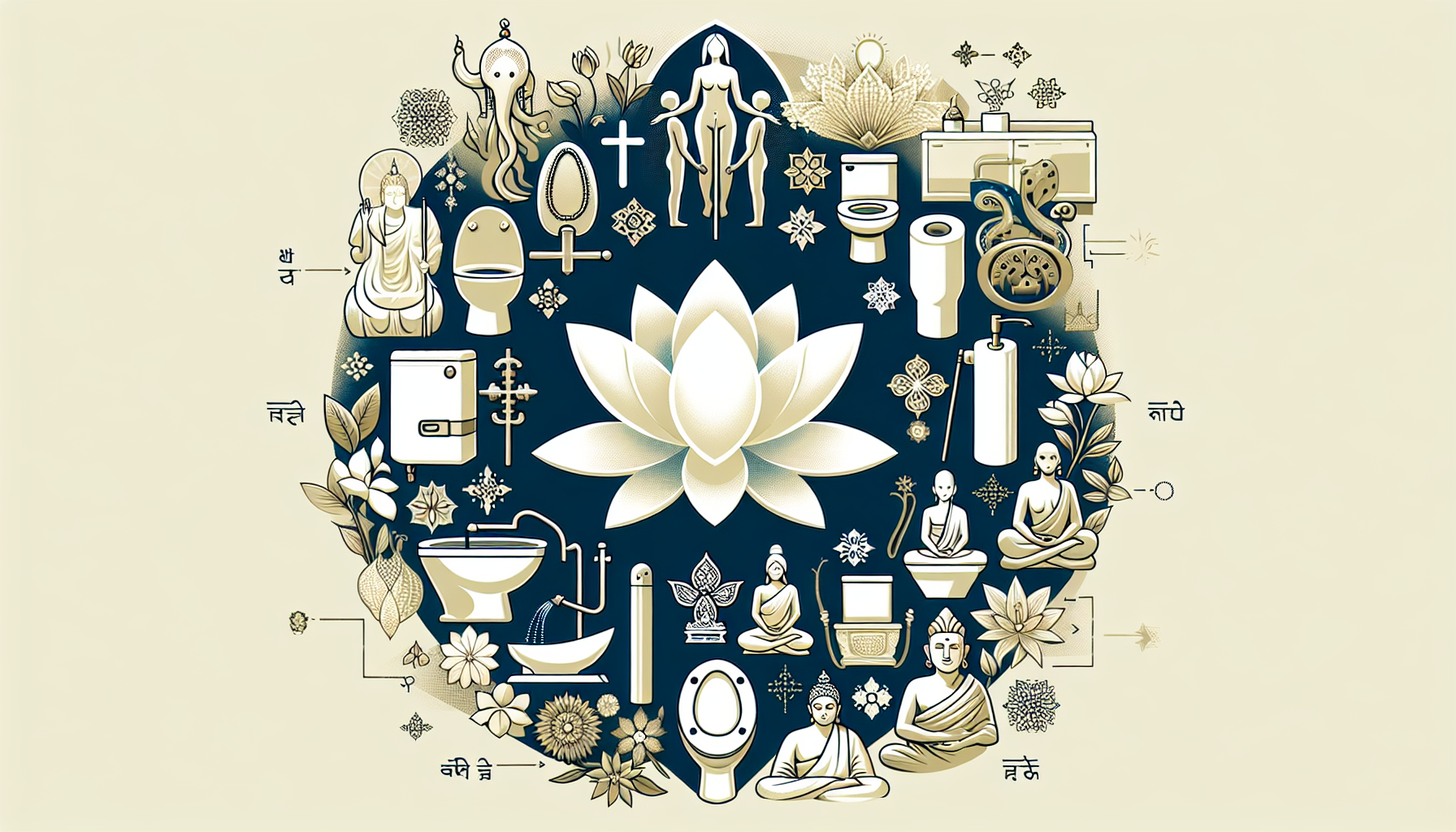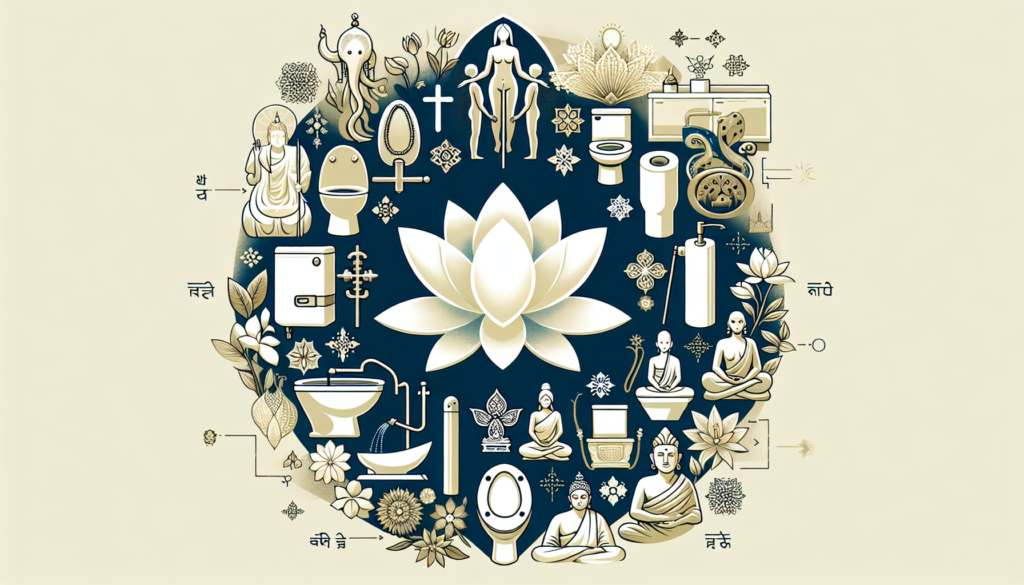In this article, we will explore the fascinating relationship between bidets and various religious or cultural practices surrounding cleanliness. From exploring the significance of bidets in different traditions to understanding how they fit into daily hygiene routines, we will delve into the ways bidets align with and accommodate different beliefs and customs. Whether you are curious about the compatibility of bidets with your religious practices or simply want to learn more about the cultural significance of these modern bathroom fixtures, this article will provide you with a friendly and informative perspective on this intriguing topic.
Islam
Ritual Cleansing in Islam
In Islam, ritual cleansing, known as Tahara, is of great importance. Muslims are required to maintain a state of ritual purity before performing acts of worship, such as prayer or reading the Quran. One of the primary methods of purification in Islam involves the use of water. Muslims are encouraged to perform ablution, known as wudu, before every prayer. This involves washing the hands, mouth, nose, face, arms, and feet. It is believed that this physical purification serves as a symbolic cleansing of the soul, preparing the individual for a direct connection with Allah.
Use of Water for Tahara (Purification)
Water holds a significant place in Islamic teachings, especially in terms of purification. It is seen as a means to cleanse oneself physically and spiritually. Muslims are encouraged to perform ghusl, a ritual bath, in certain circumstances, such as after sexual intercourse or menstruation. This thorough cleansing with water is considered essential before resuming regular prayers or other religious activities.
Bidets in Muslim Majority Countries
In many Muslim majority countries, bidets are a common fixture in bathrooms. These handheld or built-in devices provide a stream of water which can be used for cleaning oneself after using the toilet. Bidets in these regions align with the Islamic emphasis on cleanliness and the use of water for purification. They provide an alternative method to achieve ritual purity and are widely accepted as a hygienic and convenient tool for personal hygiene.
Bidets and Islamic Cultural Practices
While bidets are not explicitly mentioned in Islamic texts, they align with the broader Islamic cultural practices that emphasize cleanliness and purity. Bidets provide Muslims with a more effective and efficient means of maintaining personal hygiene, particularly after using the toilet. By facilitating thorough cleansing with water, bidets contribute to the fulfillment of Islamic rituals and help Muslims uphold the value of cleanliness in their daily lives.
Hinduism
Importance of Purity in Hinduism
Purity is a fundamental aspect of Hinduism, both spiritually and physically. Hindus believe that maintaining purity is necessary for spiritual growth and the harmonious functioning of society. Cleanliness and personal hygiene are seen as essential elements in achieving purity. Ritual purification, known as Shaucha, involves cleansing the body and mind through various practices, including the use of water.
Use of Water for Ritual Purification
Water plays a vital role in Hindu religious practices. It is believed to have purifying properties that cleanse both the physical and spiritual aspects of an individual. Hindus perform ablutions using water before engaging in worship or entering sacred spaces. Sacred rivers, such as the Ganges, hold immense importance, as bathing in their waters is believed to cleanse one of sins and bring spiritual renewal.
Bidets in Hindu Cultural Practices
While bidets may not have a direct association with Hindu cultural practices, their use aligns with the emphasis on cleanliness and purification. Bidets provide Hindus with a convenient and hygienic method for cleansing after using the toilet, promoting personal hygiene and reducing the risk of uncleanliness. Although bidets may not be prevalent in all Hindu households, their adoption may increase as individuals seek ways to align their personal hygiene practices with their religious beliefs.
Buddhism
Cleanliness and Purification in Buddhism
Cleanliness and purification hold significant importance in Buddhism as a means of maintaining physical and mental well-being. Buddhists believe that maintaining cleanliness is a reflection of inner purity and can contribute to the cultivation of mindfulness and self-discipline. Poor hygiene is viewed as a hindrance to spiritual progress and can disrupt the peace and harmony of an individual’s mind.
Cultural Practices and Bidet Usage
Bidets are not explicitly mentioned in Buddhist teachings or cultural practices. However, the use of water for cleansing aligns with the value placed on cleanliness in Buddhist traditions. Bidets provide a more efficient and hygienic method for cleansing oneself after using the toilet, promoting physical cleanliness and reducing the risk of impurities. While bidets may not be prevalent in all Buddhist communities, individuals who prioritize cleanliness and convenience may choose to incorporate bidets into their personal hygiene practices.
Harmlessness and Environmental Considerations
Buddhism places great emphasis on practicing harmlessness and compassion towards all living beings. From an environmental perspective, bidets have a positive impact as they reduce the consumption of toilet paper. This aligns with Buddhist teachings, which promote mindful consumption and the reduction of waste. By choosing bidets, individuals can align their personal hygiene practices with the principles of non-harming and environmental stewardship advocated in Buddhism.
Judaism
Mikveh and Ritual Immersion
In Judaism, mikveh is a ritual bath used for various purposes, including completing the conversion process, preparing for marriage, or after menstruation. Mikveh serves as a symbol of spiritual cleansing, renewal, and transition. Immersion in the mikveh requires full submersion in water, facilitating a physical and spiritual transformation. The use of water in mikveh aligns with the emphasis on purity and renewal in Jewish cultural practices.
Traditions of Handwashing
Handwashing holds great significance in Jewish traditions, particularly before meals. The ritual of netilat yadayim involves pouring water over each hand, ensuring cleanliness before engaging in a sacred act like eating. This practice emphasizes the importance of maintaining cleanliness and purity in daily life to connect with the divine and lead a spiritually fulfilling existence.
Potential Acceptance of Bidets
Bidets, although not explicitly mentioned in Jewish religious texts, have the potential to align with Jewish cultural practices regarding cleanliness and purity. They provide a more effective and efficient means of cleansing oneself after using the toilet, promoting personal hygiene and reducing the risk of impurities. While acceptance may vary among different Jewish communities, bidets offer a modern approach to maintaining cleanliness that can complement traditional Jewish practices.
Orthodox Judaism and Bidet Usage
Orthodox Judaism is known for adhering strictly to traditional practices outlined in the Torah and other Jewish texts. Whether the use of bidets is acceptable within Orthodox Judaism may depend on individual interpretations and guidance from religious authorities. While bidets align with the value of cleanliness in Judaism, it is recommended for individuals seeking guidance to consult with their religious leaders for a specific ruling within their community.
Christianity
Biblical Teachings on Cleanliness
Cleanliness is emphasized in various passages of the Bible, with teachings encouraging personal hygiene and cleanliness as an expression of respect for oneself and others. The Bible contains guidelines for washing hands and cleansing the body in preparation for religious rituals and acts of worship. These teachings emphasize both physical and spiritual cleanliness as means of honoring God and maintaining a pure heart.
Traditional Catholic Practices
In Catholicism, cleanliness and purity are core values. Catholics believe that cleanliness fosters reverence and respect for the body, which is considered a temple of the Holy Spirit. Traditional Catholic practices include the use of holy water for blessings, as well as the sacrament of confession, which involves confession of sins, repentance, and absolution, symbolizing spiritual cleansing and purity.
Protestant Views on Bidet Usage
Protestant views on bidet usage may vary among different denominations and individual believers. While bidets are not explicitly addressed in Protestant teachings, the emphasis on cleanliness and personal hygiene aligns with the general principles of maintaining a clean and healthy body. As with any personal hygiene practice, individual Protestants may choose to incorporate bidets into their daily routines based on personal preferences and cultural norms.
Bidets in Christian Majority Countries
Bidets are commonly found in many Christian majority countries. They are often considered a standard fixture in bathrooms and are widely used for personal hygiene purposes. Bidets provide Christians with an efficient and hygienic means of cleansing after using the toilet, allowing individuals to maintain physical cleanliness in alignment with their religious beliefs, emphasizing cleanliness as a reflection of inner purity.
Shintoism
Purity and Ritual Cleansing in Shintoism
Purity is a central concept in Shintoism, with cleanliness being highly valued. Shinto rituals often involve the use of water for purification, as it is believed to remove impurities and promote spiritual enlightenment. Shinto followers strive to maintain physical and spiritual purity to communicate with the kami, the divine spirits or deities in Shinto beliefs.
Water Symbolism in Shinto Practices
In Shinto practices, water is seen as a purifying force that can cleanse impurities and invite blessings. Purification rituals, such as misogi, involve standing beneath a waterfall or pouring water over oneself to wash away sins and impurities. The use of water in these practices symbolizes renewal, purification, and the restoration of harmony between individuals and the natural world.
Bidets in Japanese Cultural Context
Bidets are widely used in Japan, aligning with the emphasis on cleanliness and hygiene in Japanese culture, including Shinto practices. Bidets provide a more efficient and hygienic alternative to toilet paper, promoting physical cleanliness and reducing waste. Their prevalence in Japanese households reflects the cultural value of cleanliness and aligns with Shinto traditions that prioritize purity and cleanliness in daily life.
Sikhism
Importance of Purity and Cleanliness in Sikhism
Purity and cleanliness hold great significance in Sikhism. Sikhs believe in the concept of “Panch Kakar,” which includes wearing the five articles of faith, one of which is kesh (uncut hair). Sikhs are encouraged to maintain cleanliness and hygiene as a reflection of their dedication to Sikh values and the concept of spiritual purity.
Ablutions and Cleanliness Practices
Sikhs perform ablutions, known as ishnaan, to cleanse the body before engaging in spiritual practices, such as prayer or visiting gurdwaras (Sikh temples). The practice involves bathing and washing the hair as a means of physical and spiritual purification. Sikhs believe that maintaining cleanliness is essential for connecting with God and leading a righteous life.
Bidets and Sikh Cultural Norms
Bidets may not have a direct mention in Sikh religious texts, but their use aligns with the broader Sikh cultural norms of maintaining cleanliness and hygiene. Bidets provide Sikhs with a convenient and hygienic method for cleansing after using the toilet, promoting physical cleanliness and reducing the risk of impurities. Their adoption may vary among Sikh individuals and households, depending on personal preferences and cultural practices.
Atheism and Secular Perspectives
Bidets in Secular Contexts
Secular perspectives on bidets may vary, as they are not influenced by religious doctrines or cultural customs. For some atheists and secular individuals, bidet usage may be driven by personal hygiene preferences, environmental concerns, or convenience. Bidets offer an alternative to toilet paper, reducing waste and improving cleanliness. While bidets do not align with specific religious or cultural practices, they can be seen as a practical and hygienic choice in secular contexts.
Personal Preferences and Hygiene Habits
Personal preferences and hygiene habits play a significant role in bidet usage among atheists and secular individuals. Some may prefer the traditional use of toilet paper, while others may opt for bidets as a modern and convenient alternative. The choice often depends on factors such as personal comfort, cultural upbringing, environmental consciousness, and individual beliefs regarding cleanliness and hygiene. In secular contexts, bidet adoption is primarily driven by individual choices and habits.
Traditional Eastern Practices
Traditional Chinese Cleansing Practices
Traditional Chinese cleansing practices revolve around the concept of maintaining physical and spiritual balance. The practice of mingtosu involves cleansing oneself with water, emphasizing the importance of cleanliness and purity. While bidets may not be prevalent in all traditional Chinese households, the cultural value placed on cleanliness and hygiene aligns with the use of bidets as a modern means of achieving thorough cleansing.
Ayurvedic Traditions and Cleansing
Ayurveda, an ancient system of medicine originating from India, emphasizes the importance of cleanliness and hygiene for overall well-being. Cleansing practices in Ayurveda include daily rituals such as Abhyanga, or self-massage, followed by a warm shower or bath. While bidets may not be explicitly mentioned in Ayurvedic traditions, their use can align with the broader principles of cleanliness and personal hygiene advocated in Ayurveda.
Historical and Cultural Factors
Various historical and cultural factors contribute to bidet adoption in Eastern societies. Some societies in Asia have a long-standing tradition of using water for cleansing, and bidets provide a modern and efficient method for achieving cleanliness. Additionally, advancements in technology and the influence of Western cultures have introduced bidets as a popular choice for personal hygiene in Eastern societies. Historical and cultural factors shape the acceptance and prevalence of bidets in different regions.
Bidet Adoption in Eastern Societies
Bidets are commonly found in many Eastern societies, including Japan, South Korea, and parts of China. Their prevalence is a reflection of the importance placed on cleanliness and hygiene in these cultures. Bidets provide Eastern individuals with a convenient and hygienic means of cleansing after using the toilet, aligning with traditional practices and complementing the cultural value placed on cleanliness and purity.
Indigenous Practices
Cleansing Rituals and Indigenous Cultures
Indigenous cultures around the world have diverse cleansing rituals that focus on purifying the body and spirit. Cleansing practices often involve the use of natural elements, such as water, smoke, or sacred herbs, to cleanse and rejuvenate. These rituals vary across different indigenous cultures and often carry deep spiritual and cultural significance, emphasizing the importance of maintaining purity and connection with the natural world.
Water Considerations in Native Traditions
Water holds special significance in many indigenous traditions, representing the life-giving force and the connection between humans and the natural world. Cleansing with water is seen as a means of purification and spiritual renewal. Indigenous communities often have specific rituals involving water, such as bathing in sacred rivers or lakes, to wash away impurities and restore harmony within oneself and the community.
Bidets and Indigenous Cultural Perspectives
Bidets may not have direct associations with indigenous cultural perspectives on cleanliness and purification. However, the use of bidets can align with the broader values of cleanliness and hygiene held by indigenous cultures. Bidets provide individuals with an efficient and hygienic option for cleansing after using the toilet, promoting personal cleanliness and reducing the risk of impurities. Their acceptance and adoption may vary among different indigenous communities and individuals based on their cultural practices and traditions.



